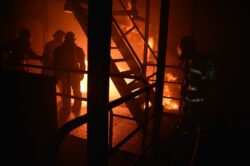N.H. National Guard Training Site – Strafford Claims
The N.H. National Guard Training Site in Strafford has become a focal point for environmental health concerns due to the discovery of PFAS contamination, which poses serious health risks to military personnel. Investigations have pinpointed the use of firefighting foams as a source of these hazardous chemicals, leading to potential long-term health consequences, including cancer. In response, individuals affected by the toxic exposure are now exploring legal claims to seek redress and compensation. Concurrently, the facility is undertaking measures to enhance energy resilience and transition towards safer firefighting alternatives by 2024. These initiatives illustrate the site's commitment to the health and safety of its members and adherence to environmentally responsible operations.

Key Takeaways
- PFAS (per- and polyfluoroalkyl substances) are the only contaminants of concern at the N.H. National Guard Training Site – Strafford.
- PFOA and PFOS, which are part of the PFAS group, are the most dangerous and have a strong association with cancer.
- Service members training at the military facility are at risk of exposure to PFAS, which poses a major health threat and can lead to the development of numerous diseases.
- Veterans and family members who spent one cumulative year or longer at the site may be at risk of developing certain diseases, including kidney cancer, testicular cancer, thyroid disease, ulcerative colitis, and bladder cancer.
PFAS Contamination Overview
The N.H. National Guard Training Site – Strafford faces scrutiny over PFAS contamination, a persistent environmental and health challenge linked to the use of AFFF firefighting foam at the facility. This situation has propelled the need for understanding PFAS contamination effects and implementing PFAS exposure prevention strategies. PFAS, due to their resistance to degradation, remain in the environment and bioaccumulate, posing risks of adverse health effects. Service members and associated personnel could face a range of diseases from prolonged exposure. The imperative for meticulous monitoring of health symptoms and the adoption of PFAS-free alternatives has become evident. Ensuring the well-being of those on base, while safeguarding environmental integrity, necessitates prompt and decisive actions to mitigate the risks associated with PFAS.
Health Risks and Diseases
Understanding the implications of PFAS contamination is critical, as exposure can precipitate a spectrum of severe health conditions for those stationed at the N.H. National Guard Training Site – Strafford. The PFAS exposure timeline varies, with diseases manifesting from several years to several decades post-exposure. Long-term health effects of PFAS include heightened risks of developing cancers such as kidney and testicular, as well as other serious illnesses like thyroid disease, ulcerative colitis, and bladder cancer. Additional associated conditions comprise various forms of lymphomas and leukemias. Due to the persistence and bioaccumulation properties of PFAS, service members who have spent considerable time at this facility must be vigilant about their health and undergo regular medical evaluations to detect any emergent health issues early on.
Claim Eligibility Criteria
Considering the diverse range of health issues linked to PFAS exposure at the N.H. National Guard Training Site – Strafford, eligibility criteria for filing a claim are centered on the diagnosis of specific diseases and the duration of residence or service at the affected location. Claim evaluation emphasizes documented medical conditions strongly associated with toxic exposure, including various cancers and thyroid disease. Individuals who have resided or served at the site for a cumulative year or longer are primarily considered for the compensation process. The claimant must provide substantial evidence of their stay and related medical diagnoses. The compensation process is geared towards providing financial support for victims' treatment and recovery. It is a systematic procedure that requires thorough documentation to establish a strong connection between military service at the site and the subsequent health conditions.
Legal Claim Process
Initiating a legal claim for toxic exposure at the N.H. National Guard Training Site – Strafford involves submitting detailed military and medical documentation to demonstrate eligibility for compensation. The claim evaluation process is a critical phase where attorneys with specialized knowledge in military base toxic exposure cases review the evidence. They assess the connection between the service member's health condition and the contaminants identified at the training site. Following a successful evaluation, the compensation process begins. This stage includes the preparation and filing of claims to seek financial redress for the harm suffered. The process is meticulously designed to ensure that those affected by PFAS exposure receive the support necessary for their treatment and well-being, with minimal bureaucratic delay.
Energy Resiliency Initiatives
In response to environmental concerns, the N.H. National Guard Training Site – Strafford has embarked on a series of energy resiliency initiatives aimed at reducing its carbon footprint and transitioning to PFAS-free firefighting foam by 2024. These actions underscore a commitment to minimize the environmental impact of its operations. The move to eradicate PFAS compounds from firefighting activities aligns with broader sustainable practices being implemented at the facility. By proactively addressing these issues, the site is not only protecting the health of service members and surrounding communities but also setting a precedent for other military installations. The comprehensive strategy to enhance energy independence and reduce reliance on non-renewable resources reflects a forward-thinking approach to environmental stewardship and operational efficiency.
Training Site Features
The N.H. National Guard Training Site – Strafford boasts comprehensive facilities and support services designed to enhance the preparedness and effectiveness of service members. The training facility amenities are extensive, ensuring that personnel have access to cutting-edge resources and environments conducive to rigorous training regimens. This includes state-of-the-art classrooms, advanced shooting ranges, and a well-outfitted gymnasium. Moreover, the site emphasizes collaborations and community outreach, partnering with local law enforcement and civilian organizations to foster a symbiotic relationship that benefits both the military and local communities. These joint exercises and initiatives not only improve tactical capabilities but also reinforce the National Guard's commitment to civic integration and support.

This post has been generated by AI and was not reviewed by editors. This is Not legal advice. Please consult with an attorney.




